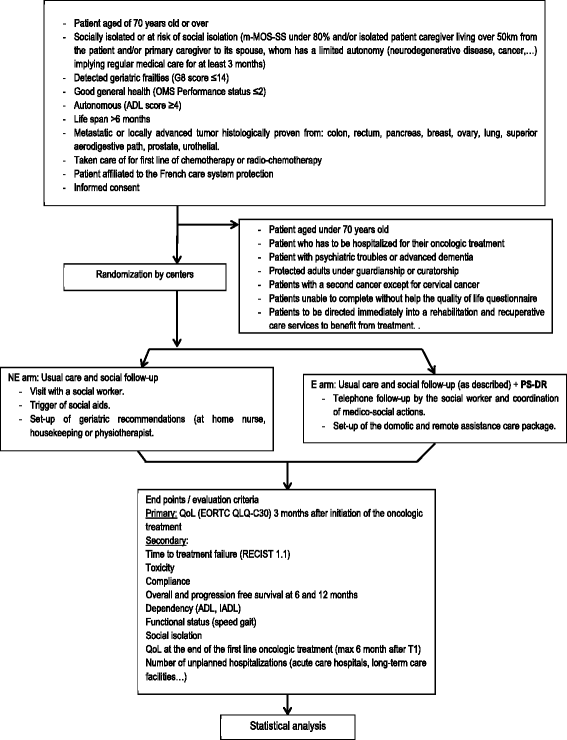PREDOMOS study, impact of a social intervention program for socially isolated elderly cancer patients: study protocol for a randomized controlled trial
- PMID: 28403911
- PMCID: PMC5389099
- DOI: 10.1186/s13063-017-1894-7
PREDOMOS study, impact of a social intervention program for socially isolated elderly cancer patients: study protocol for a randomized controlled trial
Abstract
Background: Cancer incidence and social isolation increase along with advanced age, and social isolation potentiates the relative risk of death by cancer. Once spotted, social isolation can be averted with the intervention of a multidisciplinary team. Techniques of automation and remote assistance have already demonstrated their positive impact on falls prevention and quality of life (QoL), though little is known about their impact on socially isolated elderly patients supported for cancer. The primary objective of the PREDOMOS study is to evaluate the impact of establishing a Program of Social intervention associated with techniques of Domotic and Remote assistance (PS-DR) on the improvement of QoL of elderly isolated patients, treated for locally advanced or metastatic cancer. The secondary objectives include treatment failure, tolerance, survival, and autonomy.
Methods/design: This trial is a multicenter, prospective, randomized, placebo-controlled, open-label, two-parallel group study. The setting is 10 French oncogeriatric centers. Inclusion criteria are patients aged at least 70 years with a social isolation risk and a histological diagnosis of cancer, locally advanced or metastatic disease. The groups are (1) the control group, receiving usual care; (2) the experimental group, receiving usual care associating with monthly social assistance, domotic, and remote assistance. Participants are randomized in a 1:1 allocation ratio. Evaluation times involve inclusion (randomization) and follow-up (12 months). The primary endpoint is QoL at 3 months (via European Organization for Research and Treatment of Cancer (EORTC) QLQ C30); secondary endpoints are social isolation, time to treatment failure, toxicity, dose response-intensity, survival, autonomy, and QoL at 6 months. For the sample size, 320 individuals are required to obtain 90% power to detect a 10-point difference (standard deviation 25) in QoL score between the two groups (20% loss to follow-up patients expected).
Discussion: The randomized controlled design is the most appropriate design to demonstrate the efficacy of a new experimental strategy (Evidence-Based Medicine Working Group classification). National and international recommendations could be updated based on the findings of this study.
Trial registration: ClinicalTrials.gov, NCT02829762 . Registered on 29 June 2016.
Keywords: Elderly cancer; Oncogeriatrics; Randomized controlled trial; Social intervention program; Techniques for domotic and remote assistance.
References
-
- Mininstère des Affaires Sociales et de la Santé . Préconisations pour une MObilisation NAtionale contre l’ISolement social des Agés (MONALISA). Paris: La Documentation française. 2013.
-
- De Geest K, Bender D, Ahmed A, Goodheart MJ, Dahmoush L, Zimmerman MB, Penedo FJ, Lucci JA, 3rd, Ganjei-Azar P, Thaker PH, Mendez L, Lubaroff DM, Slavich GM, Cole SW, Sood AK, Lutgendorf SK. Social influences on clinical outcomes of patients with ovarian cancer. J Clin Oncol. 2012;30(23):2885–90. doi: 10.1200/JCO.2011.39.4411. - DOI - PMC - PubMed
Publication types
MeSH terms
Associated data
LinkOut - more resources
Full Text Sources
Other Literature Sources
Medical


